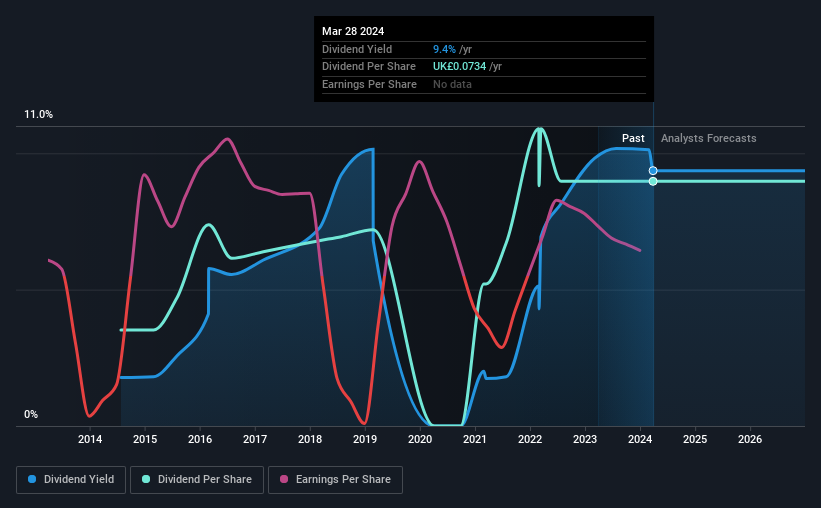The board of Reach plc (LON:RCH) has announced that it will pay a dividend on the 31st of May, with investors receiving £0.0446 per share. Based on this payment, the dividend yield on the company's stock will be 9.4%, which is an attractive boost to shareholder returns.
View our latest analysis for Reach
Reach Doesn't Earn Enough To Cover Its Payments
If the payments aren't sustainable, a high yield for a few years won't matter that much. Prior to this announcement, the dividend made up 107% of earnings, and the company was generating negative free cash flows. Paying out such a large dividend compared to earnings while also not generating any free cash flow would definitely be difficult to keep up.
Earnings per share could rise by 18.7% over the next year if things go the same way as they have for the last few years. If the dividend continues on its recent course, the payout ratio in 12 months could be 95%, which is a bit high and could start applying pressure to the balance sheet.

Dividend Volatility
The company has a long dividend track record, but it doesn't look great with cuts in the past. Since 2014, the annual payment back then was £0.0288, compared to the most recent full-year payment of £0.0734. This works out to be a compound annual growth rate (CAGR) of approximately 9.8% a year over that time. We have seen cuts in the past, so while the growth looks promising we would be a little bit cautious about its track record.
Reach Might Find It Hard To Grow Its Dividend
Growing earnings per share could be a mitigating factor when considering the past fluctuations in the dividend. Reach has impressed us by growing EPS at 19% per year over the past five years. While EPS is growing at a decent rate, but future growth could be limited by the amount of earnings being paid out to shareholders.
The Dividend Could Prove To Be Unreliable
Overall, we don't think this company makes a great dividend stock, even though the dividend wasn't cut this year. While we generally think the level of distributions are a bit high, we wouldn't rule it out as becoming a good dividend payer in the future as its earnings are growing healthily. We would probably look elsewhere for an income investment.
It's important to note that companies having a consistent dividend policy will generate greater investor confidence than those having an erratic one. Meanwhile, despite the importance of dividend payments, they are not the only factors our readers should know when assessing a company. To that end, Reach has 3 warning signs (and 1 which doesn't sit too well with us) we think you should know about. Looking for more high-yielding dividend ideas? Try our collection of strong dividend payers.
New: AI Stock Screener & Alerts
Our new AI Stock Screener scans the market every day to uncover opportunities.
• Dividend Powerhouses (3%+ Yield)
• Undervalued Small Caps with Insider Buying
• High growth Tech and AI Companies
Or build your own from over 50 metrics.
Have feedback on this article? Concerned about the content? Get in touch with us directly. Alternatively, email editorial-team (at) simplywallst.com.
This article by Simply Wall St is general in nature. We provide commentary based on historical data and analyst forecasts only using an unbiased methodology and our articles are not intended to be financial advice. It does not constitute a recommendation to buy or sell any stock, and does not take account of your objectives, or your financial situation. We aim to bring you long-term focused analysis driven by fundamental data. Note that our analysis may not factor in the latest price-sensitive company announcements or qualitative material. Simply Wall St has no position in any stocks mentioned.
About LSE:RCH
Reach
Operates as commercial news publisher in the United Kingdom, rest of Europe, and internationally.
Average dividend payer and fair value.
Similar Companies
Market Insights
Community Narratives




